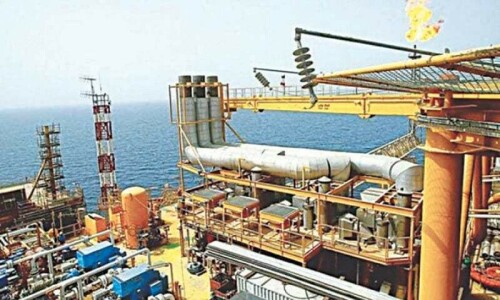PARIS: Emmanuel Macron, the 39-year-old centrist who has shaken up France’s presidential election, promised a national “transformation” and the revival of a “European dream” on Thursday as he unveiled his programme.
Helped by scandals affecting his opponents, particularly rightwinger Francois Fillon, the former economy minister has surged from an outsider to frontrunner in the race less than a year since founding his independent movement “En Marche” (On the Move).
“We are not looking to adapt or reform, but to transform,” Macron told hundreds of journalists at a launch event to set out his pro-European, pro-business agenda.
Mixing traditionally right-wing measures such as easing strict labour controls and cutting taxes, he also stressed the need for new investment in public schools and measures to help deprived, high-immigrant areas.
“We are bringing together in this programme the ideas of liberty and protection. It’s one of the main themes,” Macron said at the event which he hopes will rebut criticism he has been too vague about his platform.
An already extraordinary campaign took another turn on Wednesday when Fillon announced he would be charged over allegations he paid his wife and children hundreds of thousands of euros from public money for fake jobs.
Polls show Macron has picked up support as a result of Fillon’s woes and could reach the May 7 run-off of the two-stage vote.
In that second round, he is currently projected to face Marine Le Pen, the far-right leader with an anti-immigration, anti-EU platform, whom he would beat if the vote were held today, the polls show.
The European Parliament, where Le Pen is a member, on Thursday lifted her immunity from prosecution over her tweeting images of IS atrocities.
The action means French prosecutors can continue a case launched in 2015 when she shared a series of graphic images — one of several prosecutions which she says are designed to thwart her bid for power.
Europe: dream or nightmare?
In stark contrast to Le Pen’s virulent opposition to the European Union, which she seeks to withdraw from, Macron said “it’s obviously Europe that is at the heart of our project”. He believes France is too small to compete on its own in a globalised world and wants deeper integration between countries that use the euro, which would include the creation of a eurozone budget.
“Our responsibility in the years that come is to be able to rebuild the European dream,” he said, adding that he would seek to persuade the zone’s richest member Germany to invest in other countries.
This would face resistance in Germany, while many of Macron’s proposals for France such as labour market reform would be fiercely contested by powerful trade unions.
Macron saw this first-hand while working as an adviser to outgoing Socialist President Francois Hollande and as economy minister from 2014-2016 when he brought in a law designed to deregulate many sectors of the economy.
Asked about the possibility of street protests, he replied: “We will have democratic legitimacy on the basis of a clear programme.” He criticised other governments for trying to reform by stealth in the past, adding: “The most difficult reforms that need time ... it’s better to do them at the beginning.”
Last week, Macron promised to slice 60 billion euros off state spending over five years and said he would also shrink the civil service by 125,000 jobs. Fillon has pledged to go further and cut 500,000 jobs.
In a clear allusion to the Fillon scandal, Macron also outlined how he would bring in a ban on parliamentarians employing family members, as well as working as consultants while in office.
“We will ban lawmakers from giving friends or members of their family jobs, to put an end to nepotism,” he told a press briefing beforehand.
After another troubled day in his campaign, Fillon headed to the south of France for a campaign rally on Thursday facing his biggest challenge yet to keep his Republicans party behind him.
The 62-year-old conservative former prime minister was favourite at the turn of the year to become France’s next leader after clinching the nomination for the Republicans party in November.
But allegations that he used public funds to pay his British-born wife Penelope, with little work to show for it, have eroded his support.
Fillon will meet investigating magistrates on March 15 but he has refused to step aside, saying the charges were “entirely calculated to stop me being a candidate for the presidential election”.
Published in Dawn, March 3rd, 2017










































Dear visitor, the comments section is undergoing an overhaul and will return soon.